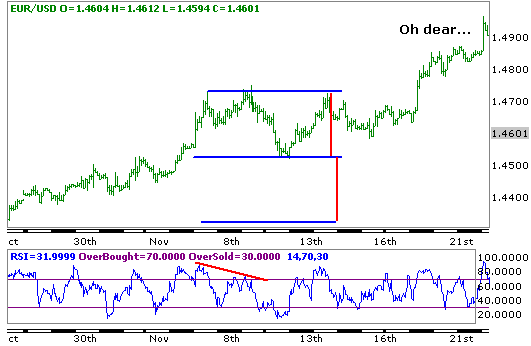When is a pattern not a pattern?
The easy answer to the question is “when it’s not a pattern”. And that really is the real crux of the issue… Let me explain.
Let’s take a look at one of the most simple patterns in technical analysis, the Double Top (Bottom).
 This is the hourly chart of Dollar-Swissie in a run up from the 1.0883 low which found a high at 1.1324. Following this it pulled back lower and then attempted to move back to the high once again. However, it failed just 6 points from that high and then declined quite sharply.
This is the hourly chart of Dollar-Swissie in a run up from the 1.0883 low which found a high at 1.1324. Following this it pulled back lower and then attempted to move back to the high once again. However, it failed just 6 points from that high and then declined quite sharply.In this process it formed what we call a “Double Top.” This is a classic reversal pattern that through measurements will provide a minimum target in the reversal. Basically, by taking the number of points from the peaks and the intervening corrective low it is then possible to project lower from that trough to generate the minimum target.
In this example the pattern has worked perfectly. What is more, the Rapid RSI below has formed what is a bearish divergence. This is recognized by higher price peaks from the intermediate peak towards the left center of the chart to the eventual 1.1324 high. However, over this period the RSI has not made new highs – but the RSI makes a lower high at the 1.1324 high which represents a slowing in the underlying momentum of the trend.
A combination of this bearish divergence and a subsequent break of a trend support line and failure on the retest of the trend line sets up a stronger reversal which meets the minimum target perfectly.
OK, this is simple, let’s look at another example:

Here we see exactly the same thing happening in the hourly Euro chart. Price has rallied strongly with Rapid RSI forming a high at 1.4751 and then on the pullback lower braches a trend support line. Following the initial decline price rallies back towards the 1.4751 high but fails on the retest of the trend line.
This looks positive. Measuring the points between the twin highs and the intervening trough, from the current price there appears to be 300 points profit.
So if I take a trade of €1mn I can make €30,000 profit and buy a new car…
Well, this is what then happened.
 Ah… the Euro actually continued rallying.
Ah… the Euro actually continued rallying.So why did the Double Top pattern fail?
As I said, because it wasn’t a double top pattern…
It is vital to understand that a double top only becomes a double top when the intervening trough is breached. (And a double bottom only becomes a double bottom when the intervening peak is breached.)
Clearly this didn’t occur here.
This is very simply explained by examining the definition of an uptrend – which occurs when both highs are moving higher while lows are also moving higher.
If we want to be safe in identifying double tops (or bottoms) we should also satisfy the requirement that the sequence of higher lows is broken – which would be when the intervening trough is breached.
Therefore, avoid this simple error which many still fall into by ensuring that the intervening trough (or peak in a double bottom) is broken to confirm a breakdown of the trend.
Gook luck !